DU vs NU: Students caught in the crossfire
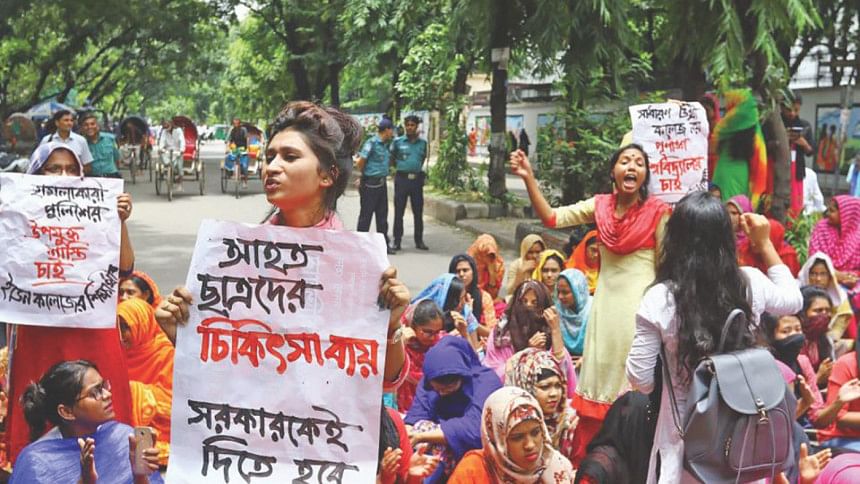
Siddiqur Rahman, while protesting, was injured in his eyes by a tear gas canister in yet another case of police brutality. One eye will never see again, another one is damaged. The reasons for his protest, along with students from seven Dhaka-based major colleges, handed over to Dhaka University from National University a few months ago, couldn't be more legitimate. While thousands of their batch mates studying in other colleges under National University are already waiting for their Masters' admission, Siddiqur and his classmates still don't know what the results of their Bachelor's exams are. Several Masters' batches are in limbo, with no idea when their examinations may take place. Why shouldn't they be agitated?
For AAMS Arefin Siddique, the vice chancellor of Dhaka University, however, "everything has been taken care of." But his own examination controller Bahalul Haque admitted that all was not well. He claims that National University is to blame for this fiasco because it failed to hand over tabulation sheets and other relevant data to Dhaka University despite repeated requests. Of course, National University disputes this claim, leaving us wondering which side is less to blame for messing up the future of hundreds of thousands of students.
Mr Siddique doesn't see any legitimate reasons why the students should be concerned. He terms student protests as "propaganda movement" and opines that it "must be investigated". It sounds like a move to suppress a spontaneous voice by insinuating sabotage. His failure to empathise with thousands of students, whose responsibility he took over a few months ago, is absurd, especially after the much-condemned incident of Siddiqur Rahman sustaining injury to his eyes in such a protest rally.
We also fail to understand why the university was so interested in taking control of the seven colleges in the first place. Education Minister Nurul Islam Nahid said the university was adamant about assuming control. Given DU's own incapability to escape the clutches of session jam completely, the idea that it will be able to handle an extra two lakh students is ridiculous. In its defence, the university can claim it had 104 colleges under its control prior to the addition of seven colleges. But what has to be noted is that the number of the students of these seven colleges is more than twice than that of Dhaka University, its affiliated colleges and institutions combined.
Most importantly, with all its faults, National University is carrying out an unnoticed yet commendable job. It has largely reduced its notorious session jam and simplified almost all of its long bureaucratic process. Especially, its "crush programme" has already yielded positive results: the current first-year students have completed their form filling, hence, waiting for examinations soon to be held—all that within less than a year. While many students saw their sessions unfairly cut short, almost all the students welcomed this programme because of its far reaching potential. The way it conducts admission tests countrywide is impressive. In addition, National University's web based services have proven convenient for its countless students.
One, therefore, wonders why National University's significant progress has not been taken into consideration while handing over seven major colleges to Dhaka University. Many students fear other government colleges will probably be conferred on regional major public universities, who are themselves mired in suffocating session jam.
Dealing with hundreds of colleges scattered around the country requires extensive coordination mechanism in place. National University with its resources solely devoted to managing these colleges has failed to be anywhere near to developing such mechanism until now. So, how could we expect public universities to develop this apparatus overnight while its main liability remains to be its own students?
What also worries everyone is that, according to a report published by Prothom Alo, personal and professional friction between two Vice Chancellors of Dhaka University and National University may be to blame for this mess. Dated back to 2012, their animosity revolves around alleged nepotism, teacher recruitment, teacher politics etc. Now, their internal discord threatens the future of scores of students. Irresponsibility is the last thing we expect from the heads of the two most important educational institutions of the country.
While the two authorities are engaged in a childish blame game, it's the students who are running out of time. Thousands of students may not be able to sit for 38th Bangladesh Civil Service (BCS) examination.
Many students are the last hope of their respective families. Siddiqur, for example, lost his father when he was three. His brother Nayeb Ali has been his only patron. So, when Siddiqur's eyes were damaged, a family dream was also shattered. And when Nayeb Ali said his last refuge of hope had been destroyed, he wasn't speaking only for his own family. Too many families are seeing their hopes disintegrating due to the delay in academic sessions.
Nazmul Ahasan is a member of the editorial department at The Daily Star. He can be reached at [email protected].



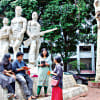
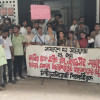
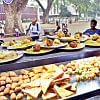
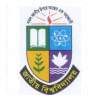
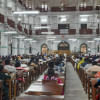


Comments